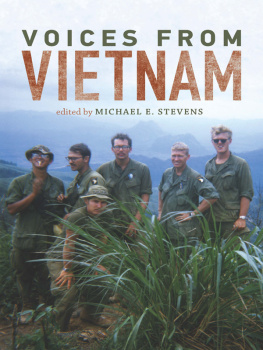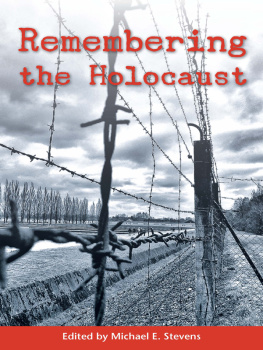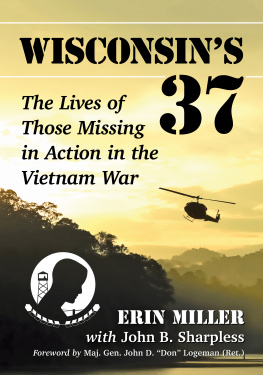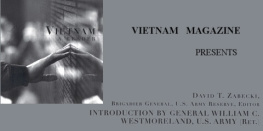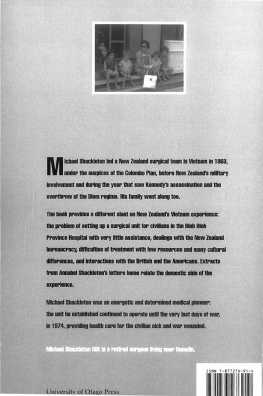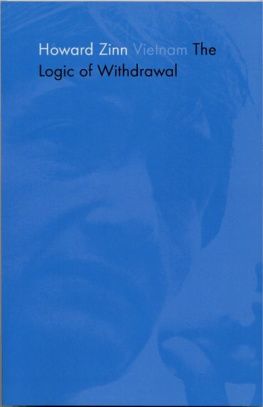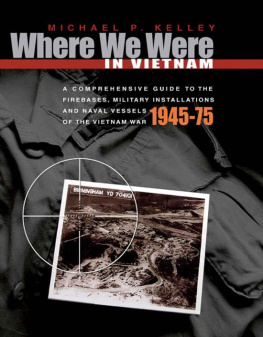Michael E. Stevens - Voices from Vietnam
Here you can read online Michael E. Stevens - Voices from Vietnam full text of the book (entire story) in english for free. Download pdf and epub, get meaning, cover and reviews about this ebook. year: 2014, publisher: Wisconsin Historical Society Press, genre: Home and family. Description of the work, (preface) as well as reviews are available. Best literature library LitArk.com created for fans of good reading and offers a wide selection of genres:
Romance novel
Science fiction
Adventure
Detective
Science
History
Home and family
Prose
Art
Politics
Computer
Non-fiction
Religion
Business
Children
Humor
Choose a favorite category and find really read worthwhile books. Enjoy immersion in the world of imagination, feel the emotions of the characters or learn something new for yourself, make an fascinating discovery.
- Book:Voices from Vietnam
- Author:
- Publisher:Wisconsin Historical Society Press
- Genre:
- Year:2014
- Rating:3 / 5
- Favourites:Add to favourites
- Your mark:
- 60
- 1
- 2
- 3
- 4
- 5
Voices from Vietnam: summary, description and annotation
We offer to read an annotation, description, summary or preface (depends on what the author of the book "Voices from Vietnam" wrote himself). If you haven't found the necessary information about the book — write in the comments, we will try to find it.
An unforgettable collection of 174 letters and diary entries written by 92 Wisconsin men and women who served in Vietnam. Includes a journal kept by Menasha native Frederic Flom on cigarette wrappers during his final 16 days of captivitythe only known diary smuggled out by a Vietnam prisoner of war.
Voices from Vietnam — read online for free the complete book (whole text) full work
Below is the text of the book, divided by pages. System saving the place of the last page read, allows you to conveniently read the book "Voices from Vietnam" online for free, without having to search again every time where you left off. Put a bookmark, and you can go to the page where you finished reading at any time.
Font size:
Interval:
Bookmark:

Copyright 1996 by
THE STATE HISTORICAL SOCIETY OF WISCONSIN
E-book edition 2014
For permission to reuse material from Voices from Vietnam (ISBN 978-0-87020-287-2; e-book ISBN 978-0-87020-693-1), please access www.copyright.com or contact the Copyright Clearance Center, Inc. (CCC), 222 Rosewood Drive, Danvers, MA 01923, 978-750-8400. CCC is a not-for-profit organization that provides licenses and registration for a variety of users.
Front cover: Co. B, 2nd 506th Infantry, Airmobile 101st Airborne CP (Command Post), March 21,1971. On the ridgeline overlooking FSB (Fire Support Base) Vandegrift with land formations The Rockpile (center - see ) and Razorback in the background are (1 to r) Sgt. Patrick Bailey, Artillery Forward Observer Radio RTO (Radio Telephone Operator); Lt. Don Speet, Artillery Forward Observer; SP4 Steve Commo, CP Medic; Capt. Carl Jensen, Company Commander; and SP4 Donald Thies, Battalion Radio RTO. In front is SP4 Buford Byers, Company Radio RTO.
Photo by SP4 Mark Wissel, Secure Set Radio RTO. WHi Image ID 87338.
Back cover: WHi Image ID 87337.
Cover design by Andrew J. Brozyna
The Library of Congress has cataloged the printed edition as follows:
Voices from Vietnam. (Voices of the Wisconsin Past.)
Michael E. Stevens, editor.
A. Kristen Foster. Ellen D. Goldlust-Gingrich, Regan Rhea, assistant editors.
Includes glossary, bibliographical references, and index.
ISBN 0-87020-285-5 [clothbound] 0-87020-287-1 [paperbound]
1. Vietnamese Conflict, 19611975Personal narratives, American.
2. Vietnamese Conflict, 19611975VeteransWisconsinDiaries.
3. VeteransWisconsinCorrespondence.
4. VeteransWisconsinDiaries.
I. Stevens. Michael E. II. Foster, A. Kristen. III. Goldlust-Gingrich, Ellen D. IV. Rhea, Regan. V. State Historical Society of Wisconsin. VI. Series.
DS559.V65 1996
959.704'38dc20 96-5333
CIP
For those who died in Vietnam
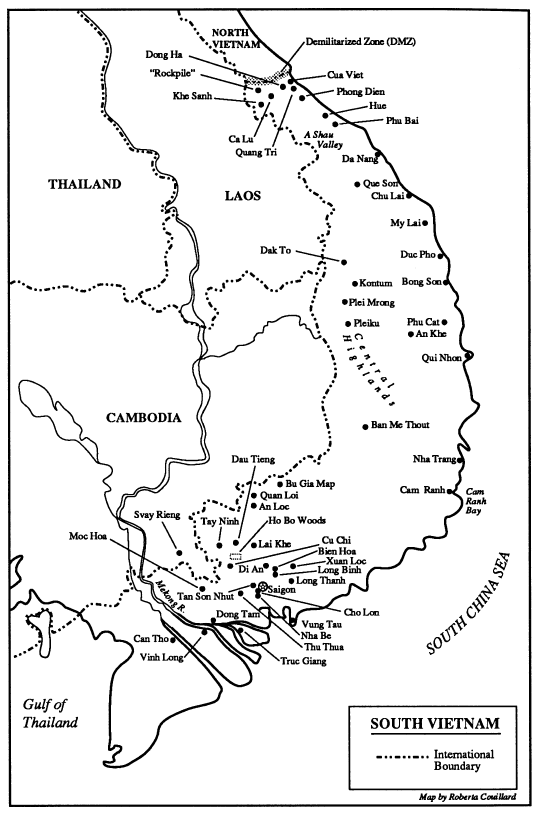
We can go without food, or luxury, but not without the support of our country, in spirit.
ROGER BOEKER, 1966
Damn this war and everything that's put us here. If I'm to die here, I only wish it were for something I believed in.
STEVE PLUE, 1970
Each generation shares a common, defining experience that distinguishes it from preceding generations. For the children of those who fought World War II, the war in Vietnam became that pivotal event. Since March, 1965, when the first U.S. ground troops landed at Da Nang, Americans have struggled to come to terms with Vietnam, and the scars of the war still remain on the national psyche. The war brought massive changes in the ways Americans viewed themselves, their government, and the world. As the nation divided between prowar hawks and antiwar doves, it tore apart the social fabric and accelerated social and cultural change. The war intensified generational conflict, turning children against parents and students against teachers. It alienated many citizens from their government, laying the groundwork for a cynical rejection of authority.
The mediaprincipally televisiongave the war an unprecedented immediacy, bringing the fighting into American homes and underscoring the human cost. At the same time, television provided a vehicle for debate over the nation's Vietnam policy, reminding viewers of the national fissures over the war. Afterward, the very term Vietnam became a reference point for public policy debates, just as Munich and appeasement had served as a ready-made analogy for those who remembered World War II.
Although the United States as a whole bore the wounds of Vietnam, the young men (and all but 7,500 of the 2.5 million U.S. military personnel in Vietnam were male) who fought the war shouldered the heaviest burden. Unlike World War II, Vietnam often divided those who fought from the many at home who opposed the war. Younger than their fathers who had fought in World War II (the average age of GIs in Vietnam was nineteen, compared to twenty-six in World War II), American soldiers in Vietnam came disproportionately from rural areas and urban working-class backgrounds. GIs knew they were risking their lives in a war not oftheir making and opposed by many of their peers. Understandably, many soldiers resented the situation. However, as the war dragged on, the GIs themselves became deeply divided, and many, though not all, came to share the views of antiwar protesters back in the States. Because of the army's policy of rotating servicemen into Vietnam for a year at a time, GIs had difficulty developing the cohesiveness found in their fathers wartime units. Vietnam veterans also returned home individually rather than as members of a military unit. While this policy gave GIs some modicum of certainty about their time of service, it also made short-timers wary of taking risks during their final months, weeks, and days in Vietnam. The end result was the gradual dissolution of morale and cohesion in the military.
Upon returning home, Vietnam veterans encountered a different reception than did their fathers. Fighting in the jungles of Southeast Asia one day and then returning to the United States on a jet airliner the next provided little time for emotional decompression and transition. More troubling, many Vietnam veterans found themselves blamed for a war that they had not wanted and had themselves grown to hate. Without the homecoming parades and honors that had feted their fathers in World War II, Vietnam veterans remained in the background, forgotten.
In recent years, however, Americans, regardless of their views on the conflict, have been able to disassociate the war from the warrior and have recognized the burden borne by many veterans. The expressions of support for returning American hostages from Iran (1981) and for Gulf War veterans (1991) and the building of the Vietnam Veterans Memorial in Washington, D.C., focused attention on Vietnam veterans. Reflection on the meaning of the war also has spurred an outpouring of memoirs, novels, and films recounting the story of the war through the filters of memory. Nearly twenty-five years after the guns fell silent, Americans at last seem ready to deal with the dark emotions generated by Vietnam.
Voices from Vietnam offers a different perspective. This book tells the story of the war as it unfolded from the point of view of the ninety-two Wisconsin men and women whose Vietnam letters and diaries appear here. Part of the Voices of the Wisconsin Past series, which presents first-person narratives about our common past from the vantage point of the participants, the texts emphasize the ordinary citizens of the state and offer an account unmediated by the historian's narrative. They provide the reader with a sense of the authentic voice of the participants.
More than 57,000 Wisconsin residents served in southeast Asia; 1,239 of them lost their lives. The letters and diaries printed here were written by men and women who either lived in the state when they joinedthe military or moved to Wisconsin after their discharges. The book also includes letters from a Red Cross worker and two civilian Army Special Services workers who served in Vietnam. Although the letters were collected from Wisconsin veterans, the stories they tell could no doubt be repeated by many of the more than 2.5 million Americans who served in Vietnam.
The letters and diaries cover a wide range of experiences and a broad sampling of opinions and attitudes. The book opens with accounts of basic training, feelings about the trip to Vietnam, and first impressions upon arrival. examines the effect of the war on the GIs relationships with their parents, younger brothers, spouses and girlfriends, children, and friends as well as with the Vietnamese people. The book's final chapter contains accounts of the heavy physical and emotional costs of the war.
Font size:
Interval:
Bookmark:
Similar books «Voices from Vietnam»
Look at similar books to Voices from Vietnam. We have selected literature similar in name and meaning in the hope of providing readers with more options to find new, interesting, not yet read works.
Discussion, reviews of the book Voices from Vietnam and just readers' own opinions. Leave your comments, write what you think about the work, its meaning or the main characters. Specify what exactly you liked and what you didn't like, and why you think so.

